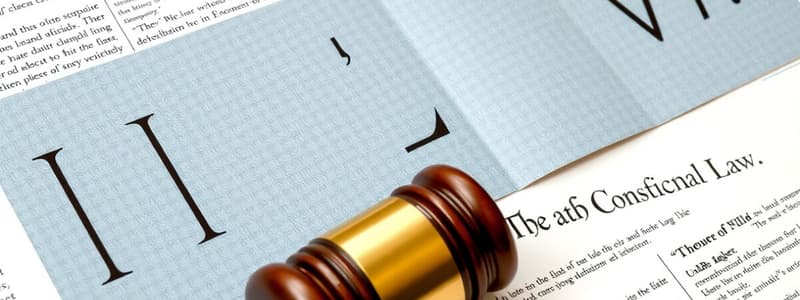Podcast
Questions and Answers
What is the National Labor Relations Act of 1935 challenged for?
What is the National Labor Relations Act of 1935 challenged for?
The Act's constitutionality when it regulates activity that occurs solely within the boundaries of one state.
What is the key issue in the NLRB v. Jones & Laughlin Steel Corp case?
What is the key issue in the NLRB v. Jones & Laughlin Steel Corp case?
Did Congress exceed its constitutional authority pursuant to the Commerce Clause when it enacted the NLRA?
What was the holding in the NLRB v. Jones & Laughlin Steel Corp case?
What was the holding in the NLRB v. Jones & Laughlin Steel Corp case?
Congress had the power, under the Commerce Clause, to regulate labor relations.
What reasoning supported the decision in the NLRB v. Jones & Laughlin Steel Corp?
What reasoning supported the decision in the NLRB v. Jones & Laughlin Steel Corp?
What legal principle was established regarding employees' rights in the NLRA?
What legal principle was established regarding employees' rights in the NLRA?
What clause could Congress possibly be violating with the NLRA?
What clause could Congress possibly be violating with the NLRA?
What was FDR's Court Packing Plan?
What was FDR's Court Packing Plan?
Flashcards are hidden until you start studying
Study Notes
Case Overview
- The case revolves around the National Labor Relations Act of 1935 (NLRA) and its constitutionality regarding state-specific activities.
Key Facts
- The NLRA aims to regulate labor relations, including employees' rights to organize and collectively bargain.
- The case specifically questions whether Congress exceeded its authority under the Commerce Clause when enacting the NLRA.
Legal Issue
- The central issue is whether the regulation of labor relations by the NLRA constitutes an overreach of congressional power under the Commerce Clause.
Court Holding
- The Supreme Court affirmed that Congress has the authority to regulate labor relations under the Commerce Clause.
- While employee discharges may occur intrastate, such actions can significantly impact interstate commerce.
Court Reasoning
- Labor disputes can have broad implications for interstate commerce, justifying congressional regulation.
- Protecting employees' rights to self-organize and choose representation is considered fundamental.
- The NLRA enhances freedom of contract rather than restricting it.
Legal Principle Established
- The ruling federally protects employees' rights to unionize and select representatives for collective bargaining.
Potential Constitutional Violation
- The argument posited that Congress might violate its constitutional authority under the Commerce Clause through the NLRA.
Historical Context
- Franklin D. Roosevelt's Court Packing Plan aimed to appoint justices sympathetic to New Deal policies but was rejected to maintain checks and balances in government.
Studying That Suits You
Use AI to generate personalized quizzes and flashcards to suit your learning preferences.





